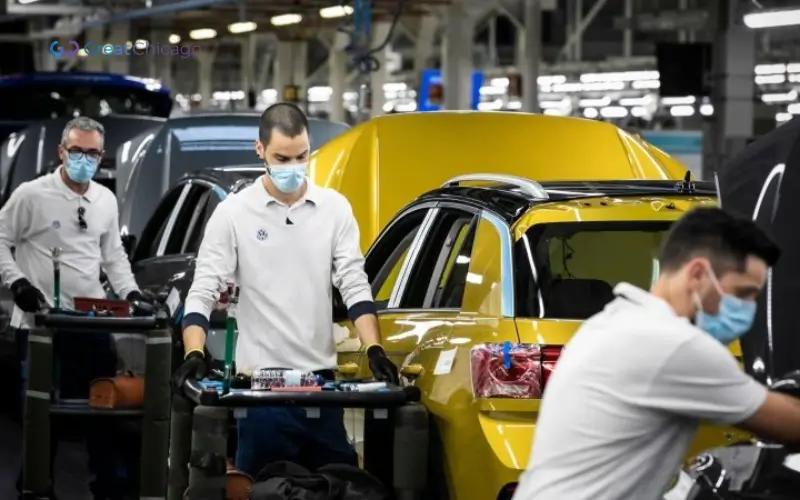Global Auto Trends | An Overview
What Does “Global Auto” Mean?
The term Global Auto means that auto industry is a global network of entity, which design, produce and sell automobiles around the world. Cars are no more local vehicles; they contain parts from different countries today. For instance, one may have a car design in German, manufacturing in Mexican and sales in India. This global collaborative structure affords acclimatization to the modern automotive technologies and efficient production cheapest.
Global Automotive Industry
It is essential to assess a role of the worldwide auto industry for economies. It results to employment, stimulates development, and affects movement. Now, cars are produced more than 90 million units per year capacity around the world and therefore it matters a lot in meeting mobility requirements. Also, global electric vehicle is on the rise indicating the much-desired change to a sustainable society.
Effects of Globalization in the Auto Industry
how the forces of globalization affect car design?
Globalization has change the actual make of automobiles. This means manufacturers are able to source all their raw materials from all over the globe, or get the expertise of the specialized individuals. As a result, automakers are able to devise cars according to the various global car markets of interest but at the same time maintain costs affordable. For example..
International Markets for Car Consumption
Every automobile manufacturing company requires international markets for its growth. With the middle class expanding in every province and countries like China and India becoming increasingly prosperous, many opportunities for the global auto industry can be seen exclusively in Asia.
Trends influencing Automotive Industry Worldwide
Electric Cars across the Globe
Electric automobile or commonly known as EVs are now the buzz and the change to the global automotive market. The top countries that are embracing the use of EVs are Norway and China. The research shows how EVs cut emissions and increase energy independence, contrary to the belief that they draw on scarce resources. Further, there is an increased use of public transport because of government incentives’ patronage and the growing awareness of environmental problems.
SELF-DRIVING CARS
Automobile manufactures have not stopped dreaming about self-driving cars as the next big thing in future car production. Autonomous driving technologies are currently a primary focus of companies with significant amounts of money being invested in this technology. However, its adoption remain high due to infrastructure and regulatory barriers in the different parts of the world.
Global Automotive Supply Chain
Encountered Managing an International Supply Chain
The automotive supply chain network is complex since it covers several stages in various countries from sourcing raw materials to the component level and then to the final vehicles. This balance is upset by geopolitical tensions, increased costs of fuel, and even pandemics respond which affects the general production pattern in the industry.
International Supply Chain Challenges
Auto makers have started adopting plans of alleviating these global supply chain problems through strategies such as supplier variety and nearshoring. The use of AI, IoT, and other technologies can keep up pace and enhance the supply chain depending on the scope of international situations.
Increasing Advancement of Automotive Technology
Showa Improved
Self-driving features that were considered extras a few years ago like automatic emergency brake, lane keep assistance, and adaptive speed control are among the most common in today’s cars. These innovations are enhancing vehicle safety globally, cutting the number of accidents, and fatalities while addressing international automotive trends.
Smart Car Technology
Smart cars are self-driven cars that have features of internet connectivity, internet enabled navigation and internet enabled automated driving. These technologies serve not only as features improving the driving experience but also as enablers of sustainable connected and automated mobility that shapes the global auto industry.
Emerging Markets: The future in automobile consumptionowards
Major Stake Holders Across Asia
These include Asia, South America and Africa markets that are rising to take central positions in the automotive industry. New model cars have consequently flooded markets of India, Brazil and other developing nations, especially due to rise in income levels and rate of urbanization as increased numbers of people aspire to own efficient and stylish vehicles, which is driving the car sales and in extension the growth of auto industries at the global level.
Chances in Underserved Areas
Currently, a great opportunity exists for the automakers to open up markets they have not really explored in the global Market. By developing small cars suitable for local requirements of countries where the sales of automobiles are rapidly growing and consequently forging distribution and production joint ventures, the global vehicle makers can expand the extent of their operations.
Evironmental and Regulatory Factors
How emission norms impact the worldwide sector?
Regulations for emissions are tightening up globally and auto manufacturing companies are being forced to develop cleaner technologies and diminish their ecological impact. Although such regulations are vital in combating climate change, the changes that come with them work out costly and alters the architectural layout of vehicles globally shaking up the international auto industry in every way.
Customer Satisfaction And Sustainable Practices
Several firms in the automotive industry across the world are considering sustainable strategies to meet international environmental standards. Some of these are utilization of recycled materials in the production of polyethylene spreaders, minimizing the amount of polyethylene used, and replacing the traditional sources of energy used while manufacturing the polyethylene spreaders by other renewable forms of energy.
Global Auto Industry
Contribution to Global GDP
Automotive trade has a huge economic impact in the global economy. Automotive industry is an important contributor to this world’s economy through employing people, innovation and through exports as well as imports in various countries. It also fosters advancement in technology by promoting the use of electric cars besides emerging smart car technologies.
Trade War and Tariff issues
Trade wars and other tariff questions have persistently emerged as critical issues of the global auto industry. These problems can raise manufacturing costs, distort the chains of supply, and make globalization arrangements much more challenging. These hurdles have reached the automotive industry where manufacturers have to tread anxiously to avoid significant losses and disruptions to assembly line and selling channels.
Auto Production Seemed
Planned Amount of Automobiles by 2030
The above global car manufacturing industry shows that by the year 2030, the supply of cars will be made of electric vehicles Autonomous vehicles. Powered by increasing battery efficiency and raising the bar in environmental consciousness, EVs will be cheaper to produce and are unequivocally gaining a reputation as the world’s vehicle of choice for automobile production.
How Automation is Transforming Factories?
Automotive industry is continuing to evolve and become more automated at an unprecedented rate around the world. Automated mechanisms such as robots, artificial intelligence, etc,. are being incorporated in industries for minimization of errors, improvement of productivity, and of course.
Conclusion
The global auto industry is under transformation and the need to embrace electric vehicles, smart technologies and sustainabl,cljs. It is important for automobile companies to know that various changes in the market happen and what they propose in order to continue being a market power and consumer-oriented. Continuing to respond to these trends would be the key to success as the industry goes forward.
Automotive industry is a significant component of the connected world; it affects mobility, trade and global economy. The future of the auto industry is therefore interlinked with smart technologies, better eco-system of manufacturing and visionary designs linking the international market in order to create more smart, connected and sustainable transport systems.
FAQs:
What constitutes the global auto industry?
The auto industry is concerned with the design, manufacturing, promoting and selling of automobiles anywhere.
What contribution does globalization make to car production?
On one hand, globalization increases international cooperation and rationalizes many sectors, while on the other hand.
What current trends affect the auto industry on the global level?
These are electric vehicles, smart cars, and green manufacturing.
Which countries are leaders in auto market?
We now have the United States, China, Germany and Japan dominating this market space, while the growth of India.
The position of emerging markets in world auto?
They generate new demand to increase sales, provide new locations for manufacturing, assembling, and researching new products.








